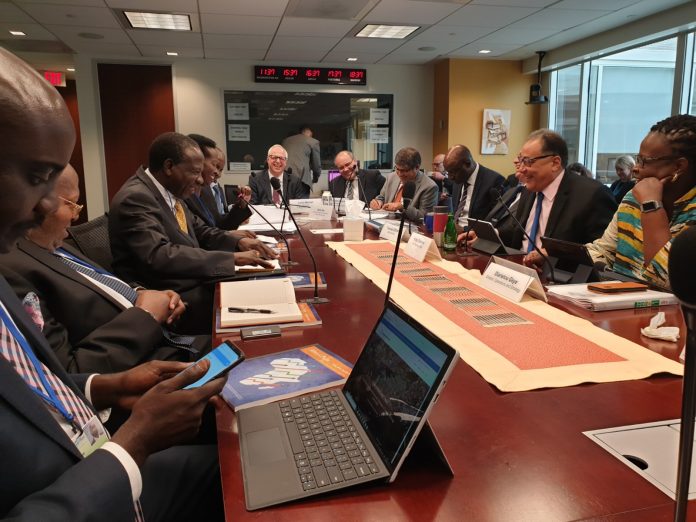The World Bank has approved $ 500 million (UGX1,8 trillion) to support Uganda’s refugee programme.
The World Bank Vice- President for Africa, Mr. Hafez Ghanem made the announcement on Friday while meeting the Minister of Finance, Planning and Economic Development, Matia Kasaija at the on-going World Bank /International Monetary Fund Spring Meetings in Washington, DC, United States of America.
The grant will support Refugees and Refugee host communities through development projects that will support services such as Education and Healthcare.
The World Bank Vice President said Uganda is one of the 2 countries that have been selected to access World Bank grant under the refugee window.
These funds will be availed to Uganda as soon as the due processes have been completed. Uganda hosts one of the largest refugee populations in the world.
Refugee documentation
Among all the East African countries, Uganda was found to be the most advanced in terms of systematic provision of documentation to refugees and migrants.
While the report recognises Rwanda’s determination to follow in Uganda’s footsteps, it is not so complimentary about Kenya and Uganda, accusing them of creating an atmosphere of hostility in migration management. Indeed, the two countries are portrayed as pursuing, albeit implicitly, xenophobic policies.
In August 2018, Rwanda issued more than 2,500 identity cards to refugees in the country to enable them to move freely and to improve refugee access to public services and labour market opportunities.
National documentation — registration certificates, identity cards and permits — serve as the bedrock for accessing rights and entitlements within states, whether at arrival, departure or junctures in-between.
The study, conducted by the African Regional Office of the Open Society Foundations and the African Centre for Migration and Society of the University of the Witwatersrand in South Africa, also found that migrants seeking work experience the most obstacles with regard to obtaining work permits in Tanzania and Kenya.
Uganda is also the least punitive when it comes to requiring that mobile migrants carry their documentation with them while in public.
Comparatively, Kenyan authorities are said to be hyper-vigilant about stopping individuals in public who they perceive to be foreigners to check their legal status.
A refugee in Uganda said such an encounter only occurred three or four times in the 10 years that he lived in Kampala, whereas a foreign staffer of an international NGO in Kenya said she could not count the number of times she was stopped in Nairobi in the course of one year.
Uganda: Role model?
One of Uganda’s hallmarks acts is its longstanding, free-of-charge distribution of viable agricultural land to refugees.
This is probably the reason Uganda was enlisted as the pilot country for the Comprehensive Refugee Response Framework (CRRF), as well being a participant in the World Bank’s IDA18 support scheme. The framework is lauded internationally.
The IDA18 regional sub-window for refugees and host communities provides $2 billion (between July 1, 2017 and June 30, 2020) of funding to help low-income countries hosting large numbers of refugees.
But, as the report observes, Uganda’s increasing refugee caseload is decreasing the size of the plots of land given to refugees.
“This has become a common talking point among informants, who express concern over the sustainability of such a refugee regime,” adds the report.
“Nevertheless, there is an air of optimism that Uganda’s tradition of hospitality will continue, as stipulated in the government’s participation in the CRRF,” continues the report.
Additionally, among steps that Uganda has put in place for the enjoyment of migrants rights is the 2040 National Development Plan, which integrates refugees with the framework, delineating access to the same services in education and health.
Compared with other countries in the study, there was limited concern about non-refugee migrants among ordinary populations in Uganda.
Beyond Uganda — whether in Kenya, Tanzania or Rwanda — movement is restricted, with official encampment policies in place in the former two countries.
“Generally, by comparison, Tanzania and Kenya are relatively restrictive, with strict limitations on movement of refugees and with largely protectionist migration regimes that make it difficult for refugees and non-nationals — particularly low-skilled migrants — to migrate for work,” notes the 121-page report.





















